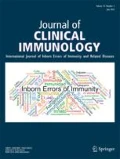Abstract
Introduction
Immunodeficiency with hyper-IgM (HIGM) results from genetic defects in the CD40–CD40 ligand (CD40L) pathway or in the enzymes required for immunoglobulin class switch recombination and somatic hypermutation. HIGM can thus be associated with an impairment of both B-cell and T-cell activation.
Results and discussions
There are seven main subtypes of HIGM and the most frequent is X-linked HIGM, resulting from CD40L mutations. In addition to the susceptibility to recurrent and opportunistic infections, these patients are prone to autoimmune manifestations, especially hematologic abnormalities, arthritis, and inflammatory bowel disease. Furthermore, organ-specific autoantibodies are commonly found in HIGM patients.
Conclusions
The mechanisms by which HIGM associates to autoimmunity are not completely elucidated but a defective development of regulatory T cells, the presence of IgM autoantibodies and an impaired peripheral B-cell tolerance checkpoint have been implicated. This article reviews the main subtypes of HIGM syndrome, the clinical autoimmune manifestations found in these patients, and the possible mechanisms that would explain this association.

Similar content being viewed by others
References
Notarangelo LD, Hayward AR. X-linked immunodeficiency with hyper-IgM (XHIM). Clin Exp Immunol 2000;120:399–405.
Lougaris V, Badolato R, Ferrari S, Plebani A. Hyper immunoglobulin M syndrome due to CD40 deficiency: clinical, molecular, and immunological features. Immunol Rev 2005;203:48–66.
Hervé M, Isnardi I, Ng YS, Bussel JB, Ochs HD, Cunningham-Rundles C, et al. CD40 ligand and MHC class II expression are essential for human peripheral B cell tolerance. J Exp Med 2007;204:1583–93.
Hess S, Engelmann H. A novel function of CD40: induction of cell death in transformed cells. J Exp Med 1996;183:159–67.
Etzioni A, Ochs HD. The hyper IgM syndrome—an evolving story. Pediatr Res 2004;56:519–25.
Levy J, Espanol-Boren T, Thomas C, Fischer A, Tovo P, Bordigoni P, et al. Clinical spectrum of X-linked hyper-IgM syndrome. J Pediatr 1997;131:47–54.
Facchetti F, Appiani C, Salvi L, Levy J, Notarangelo LD. Immunohistologic analysis of ineffective CD40–CD40 ligand interaction in lymphoid tissues from patients with X-linked immunodeficiency with hyper-IgM. Abortive germinal center cell reaction and severe depletion of follicular dendritic cells. J Immunol 1995;154:6624–33.
Seyama K, Nonoyama S, Gangsaas I, Hollenbaugh D, Pabst HF, Aruffo A, et al. Mutations of the CD40 ligand gene and its effect on CD40 ligand expression in patients with X-linked hyper IgM syndrome. Blood 1998;92:2421–34.
Notarangelo LD, Lanzi G, Peron S, Durandy A. Defects of class-switch recombination. J Allergy Clin Immunol 2006;117:855–64.
van Kooten C, Banchereau J. CD40–CD40 ligand. J Leukoc Biol 2000;67:2–17.
Van Hoeyveld E, Zhang PX, De Boeck K, Fuleihan R, Bossuyt X. Hyper-immunoglobulin M syndrome caused by a mutation in the promotor for CD40L. Immunology 2007;120:497–501.
Cron RQ. CD154 transcriptional regulation in primary human CD4 T cells. Immunol Res 2003;27:185–202.
Durandy A, Peron S, Fischer A. Hyper-IgM syndromes. Curr Opin Rheumatol 2006;18:369–76.
Durandy A, Revy P, Imai K, Fischer A. Hyper-immunoglobulin M syndromes caused by intrinsic B-lymphocyte defects. Immunol Rev 2005;203:67–79.
Revy P, Muto T, Levy Y, Geissmann F, Plebani A, Sanal O, et al. Activation-induced cytidine deaminase (AID) deficiency causes the autosomal recessive form of the Hyper-IgM syndrome (HIGM2). Cell 2000;102:565–75.
Jain A, Ma CA, Liu S, Brown M, Cohen J, Strober W. Specific missense mutations in NEMO result in hyper-IgM syndrome with hypohydrotic ectodermal dysplasia. Nat Immunol 2001;2:223–8.
Gulino AV, Notarangelo LD. Hyper IgM syndromes. Curr Opin Rheumatol 2003;15:422–9.
Lacroix-Desmazes S, Resnick I, Stahl D, Mouthon L, Espanol T, Levy J, et al. Defective self-reactive antibody repertoire of serum IgM in patients with hyper-IgM syndrome. J Immunol 1999;162:5601–8.
Seyama K, Kobayashi R, Hasle H, Apter AJ, Rutledge JC, Rosen D, et al. Parvovirus B19-induced anemia as the presenting manifestation of X-linked hyper-IgM syndrome. J Infect Dis 1998;178:318–24.
Winkelstein JA, Marino MC, Ochs H, Fuleihan R, Scholl PR, Geha R, et al. The X-linked hyper-IgM syndrome: clinical and immunologic features of 79 patients. Medicine (Baltimore) 2003;82:373–84.
Webster EA, Khakoo AY, Mackus WJ, Karpusas M, Thomas DW, Davidson A, et al. An aggressive form of polyarticular arthritis in a man with CD154 mutation (X-linked hyper-IgM syndrome). Arthritis Rheum 1999;42:1291–6.
Melegari A, Mascia MT, Sandri G, Carbonieri A. Immunodeficiency and autoimmune phenomena in female hyper-IgM syndrome. Ann N Y Acad Sci 2007;1109:106–8.
Quartier P, Bustamante J, Sanal O, Plebani A, Debré M, Deville A, et al. Clinical, immunologic and genetic analysis of 29 patients with autosomal recessive hyper-IgM syndrome due to activation-induced cytidine deaminase deficiency. Clin Immunol 2004;110:22–9. Erratum in: Clin Immunol. 113:220, 2004.
Orange JS, Levy O, Geha RS. Human disease resulting from gene mutations that interfere with appropriate nuclear factor-kappaB activation. Immunol Rev 2005;203:21–37.
Kumanogoh A, Wang X, Lee I, Watanabe C, Kamanaka M, Shi W, et al. Increased T cell autoreactivity in the absence of CD40–CD40 ligand interactions: a role of CD40 in regulatory T cell development. J Immunol 2001;166:353–60.
Rathmell JC, Townsend SE, Xu JC, Flavell RA, Goodnow CC. Expansion or elimination of B cells in vivo: dual roles for CD40- and Fas (CD95)-ligands modulated by the B cell antigen receptor. Cell 1996;18(87):319–29.
Datta SK, Kalled SL. CD40–CD40 ligand interaction in autoimmune disease. Arthritis Rheum 1997;40:1735–45.
Desai-Mehta A, Lu L, Ramsey-Goldman R, Datta SK. Hyperexpression of CD40 ligand by B and T cells in human lupus and its role in pathogenic autoantibody production. J Clin Invest 1996;97:2063–73.
Author information
Authors and Affiliations
Corresponding author
Rights and permissions
About this article
Cite this article
Jesus, A.A., Duarte, A.J.S. & Oliveira, J.B. Autoimmunity in Hyper-IgM Syndrome. J Clin Immunol 28 (Suppl 1), 62–66 (2008). https://doi.org/10.1007/s10875-008-9171-x
Received:
Accepted:
Published:
Issue Date:
DOI: https://doi.org/10.1007/s10875-008-9171-x




